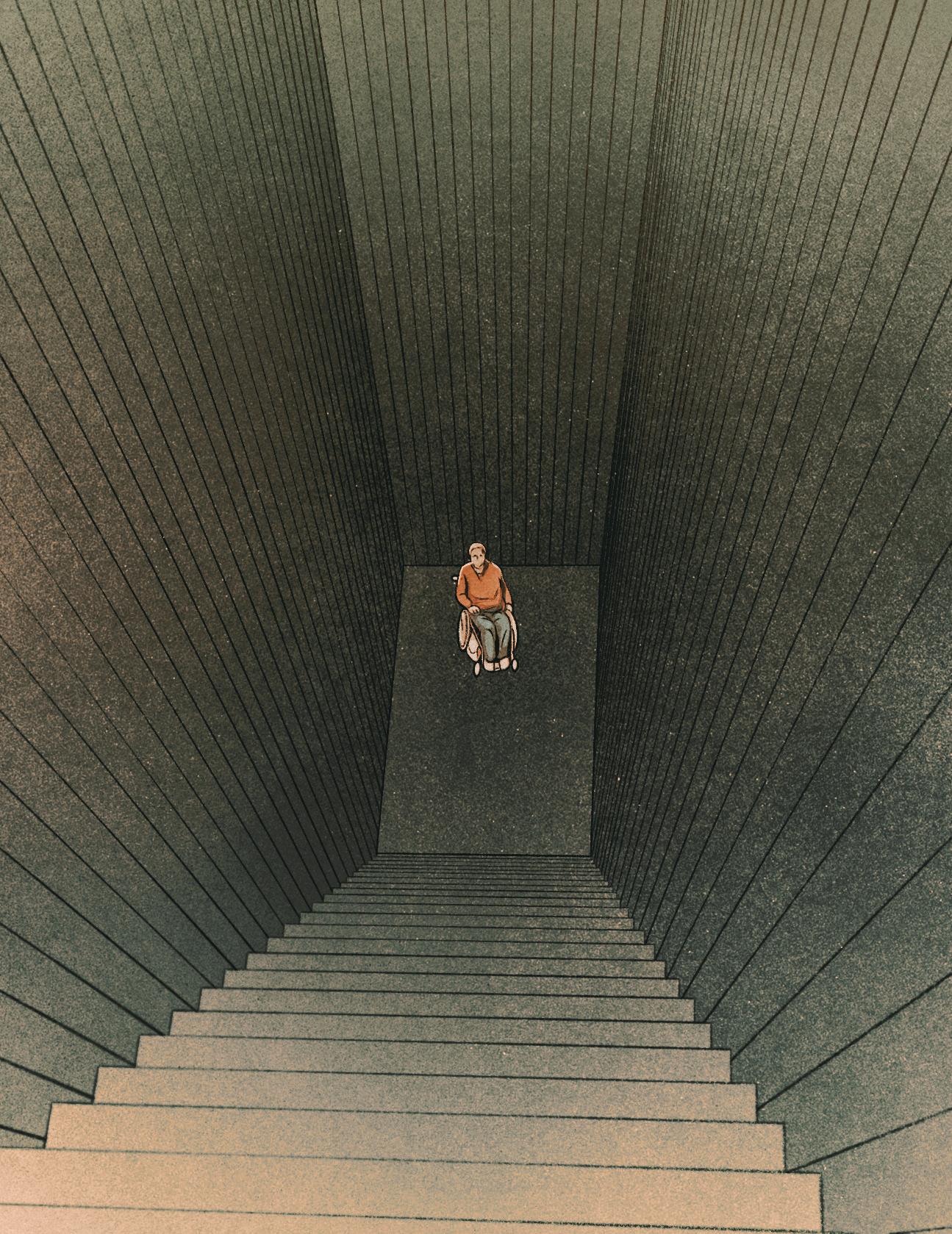
WHEN ALBERT DIAZ, then 41, took his seat in the Social Security Administration's hearing room in Wilkes-Barre, Pennsylvania, in October 2011, he had to lower himself onto his left buttock to avoid stabbing pain in his right leg. His dominant arm, the right one, was locked in a brace to keep it from curling in toward his body. He shook uncontrollably, a side effect of an electrical stimulation device implanted in his spinal cord to manage relentless pain. Three years earlier, Diaz had fallen backward three stories down an elevator shaft while working as a maintenance director in a luxury apartment building. Since the accident, his family of nine had relied on his wife's teaching salary. His application for federal disability benefits was denied, and after waiting a year for a hearing, he'd come to appeal that decision before an administrative law judge (ALI).
During the half-hour hearing, Diaz told the judge about his pain and how his family has to help him bathe, get dressed, and shave. Following his testimony, a vocational expert spent a few minutes testifying about what someone in Diaz's condition could do for work. The conversation went like this: The judge asked the expert to imagine a hypothetical person of Diaz's age, education, and work experience. Now, the judge said, imagine that this person can do light work, with limitations. "There would be a bilateral lower extremity push/pull limitation," she clarified, "occasional climbing, balancing, and stooping but never on ladders, never kneeling, crouching, or crawling."
The judge then asked the vocational expert whether there were any jobs suited to such a person. Considering only the factors the judge had described, the expert answered that the person could be a "greeter/host," and indicated that there were about 200 or 300 such jobs in northeastern Pennsylvania. Or they could be a "price marker"-who attaches price labels to merchandise-1,100 to 1,200 jobs.
This story is from the September/October 2022 edition of Mother Jones.
Start your 7-day Magzter GOLD free trial to access thousands of curated premium stories, and 9,000+ magazines and newspapers.
Already a subscriber ? Sign In
This story is from the September/October 2022 edition of Mother Jones.
Start your 7-day Magzter GOLD free trial to access thousands of curated premium stories, and 9,000+ magazines and newspapers.
Already a subscriber? Sign In

In the Name of the Mother - How Shyamala Gopalan Harris raised a presidential contender
Shyamala Gopalan Harris did not believe in coddling. Pay her daughters, Kamala and Maya, an allowance for doing chores? “If you do the dishes, you should get two dollars,” scoffed the woman who this past summer, almost two decades after we spoke, would launch a million coconut memes. “You ate from the damn dishes!” Reward the future vice president of the United States—and possible future president—for good grades? Ridiculous. “What does that tell you?” her mother chided. “It says, ‘You know, I really thought you were stupid. Oh, you surprised Mommy!’ No.”

Kill the Messenger - The anti-disinformation field is retreating under attack.
A few months ago, a man crawling along a rooftop in Pennsylvania tried to murder Donald Trump at a campaign rally. Hours later, press releases started to circulate, from analysts, think tanks, politicians, and pundits, all offering to cut through the swell of confusion and misinformation.

Food + Health / Global Warning - Why Project 2025 is an environmental catastrophe in the making
When President Joe Biden took office, Democrats held a slim majority in the House of Representatives and a single-vote edge in the Senate. Despite the monumental odds, he has presided over the most productive presidential term for climate action in American history. Under Biden’s direction, the federal government took up the arduous task of incorporating climate considerations into scores of administrative operations and procedures. The epa cracked down on superpollutants and issued stricter emissions regulations for passenger vehicles. The Inflation Reduction Act, the biggest climate spending bill Congress has ever passed, brings the nation closer to its goal of slashing carbon emissions in half by 2030.

Trumpnesia - To get a second chance, Trump needs voters to forget his disastrous presidency.
One of the most oft-quoted sentences ever penned by a philosopher is George Santayana’s observation that “those who cannot remember the past are condemned to repeat it.” In 2024, this aphorism is practically a campaign slogan. Donald Trump, seeking to become the first former president since Grover Cleveland to return to the White House after being voted out of the job, has waged war on remembrance. In fact, he’s depending on tens of millions of voters forgetting the recent past. This election is an experiment in how powerful a memory hole can be.

WHEN IN DROUGHT
This obscure yet adaptable grain could be a healthy staple for a warming planet.

BAD HABITS
A spate of recent horror movies recycle tired tropes about nuns-and reveal society's ongoing discomfort with independent women.

Taking the Fifth For a glimpse of the Supreme Court after a second Trump term, look at the radical circuit court that's already driving America to the right.
Imagine obamacare is dead and millions of Americans have lost health coverage.

THE ARCHITECT
TRUMP WANTS TO BE KING. RUSS VOUGHT HAS A PLAN TO MAKE IT HAPPEN.

Losing Faith
As an evangelical leader, I enticed lawmakers and federal judges to adopt a conservative Christian agenda. Donald Trump’s rise proved how wrong I was.

GOD'S COUNTRY
These Christian nationalists have a plan to take over Americafrom small towns to the highest court in the land.